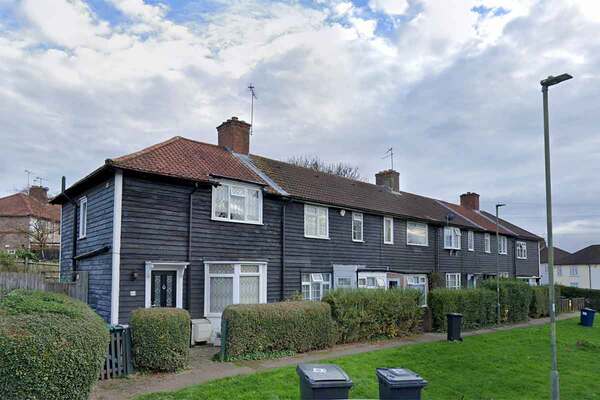You are viewing 1 of your 1 free articles
An interested party
On his 10th anniversary of taking over at National Housing Federation (NHF), Peter Apps met David Orr to discuss the new environment for housing associations and his time at the helm of the sector.

Source: Tim Foster
A small framed quote has pride of place among the clippings and photographs in David Orr’s office and sums up what the NHF chief executive is all about. Somewhat surprisingly, it comes from arch-Tory Michael Gove. In black block capitals, it reads ‘David Orr is not a dis-interested party’.
The quote came from the then-chief whip’s frustrated response to being played a clip of Mr Orr during a Newsnight debate about housing in the recent election campaign. But it is a badge his rival has come to wear with some pride.
‘My daughter was watching and thought it was hilarious, so she had it framed and sent it to me,’ he says.
Last week was the 10-year anniversary of Mr Orr’s tenure as chief executive of the NHF. It is a decade which has taken in the global recession, two changes in government and many fundamental changes to the way housing associations operate.
Throughout those 10 years, Mr Orr has become a key voice in Westminster and the media, arguing the sector’s case to three prime ministers, three chancellors and a small army of housing ministers.
But just days after the anniversary, Mr Orr finds himself facing perhaps the toughest lobbying challenge yet. After already promising to extend Right to Buy discounts to housing association stock, George Osborne tore up the 10-year rent settlement, with potentially devastating consequences for housing association business plans and the homes they were looking to build. Inside Housing met Mr Orr the day before the announcements, and had a further chat as the scale of the Budget became clear.
Lines of communication
‘No one expected that announcement,’ he says. ‘The challenge we have now is working out exactly how much capacity is taken out of the sector as a result, and that the government understands that.
‘I was with one housing association last week and they said that if we continue to deliver our development programme, we would have to make half our staff redundant.’
In the face of this, Mr Orr finds himself in a quandary. Should he speak out and risk alienating the politicians who will hold all the cards for five years, or moderate his criticism and risk being seen as a collaborator with a government which many now believe is overtly hostile to the sector?
‘I remain keen to keep the line of communication open,’ he says. ‘Is this a watershed moment? Yes. But are there still things the government could do to benefit housing associations? Yes. Is this time to stop talking to them? No.’
His warning to the government at the moment is that it is stripping ‘an enormous amount of capacity’ out of the sector, which has a lot to offer the government in terms of building new homes – but also community work, helping people back into work and much more.
‘On the early indications, there are a small number of housing associations for whom it will be a significant challenge to survive. But there are more who are saying we can survive but we will not be doing a lot of the things that we are here for,’ he says.
Arguments of one kind or another with government have become familiar territory for Mr Orr over his 10 years. He says he has ‘argued with most housing ministers’ at some stage, but he apparently left a good mark on at least one. John Healey, Labour housing minister between 2009 and 2010, describes him as a ‘first class industry leader’.
‘He’s got a passion for housing which goes right back to the early days of his career,’ says Mr Healey. ‘He’s not just a professional chief executive that could equally do the job for any sector.’
However, Mr Healey said his biggest disagreement with Mr Orr came over rent setting – where he questions the NHF’s decision ‘to overplay its hand’ and warn of drastic consequences ‘which never materialised’.
The NHF finds itself in a very similar position today in battles over the rent reduction and the Right to Buy extension – a policy Mr Orr describes as ‘strategically inept’ – and will not gain any favour with government if it is again seen to be overplaying its hand.
‘We’re still having the conversation with government [about the details of Right to Buy],’ he says. ‘For as long as we’re having the conversation, there’s a possibility that things will improve.’
But he clearly has some real concern about the policy direction the government is taking.
‘I’m not sure this is a government – either the coalition government or this new one – which in its gut believes that social housing is business critical, or that it is a responsibility [of government] to be engaged in delivering housing, and I think that’s a challenge for us,’ he says.
After media battles in the last parliamentary term over the bedroom tax, cuts to grant for affordable housing and now the Right to Buy and rent changes, does he worry this relationship between the sector and the government is broken? Mr Orr pauses.
‘I don’t think it’s a broken relationship, but I think it’s stretched,’ he says. ‘This definitely looks like a difficult week. But there will be weeks after it that will be not so difficult.’
Hope for the future
There are some green shoots, Mr Orr believes. He says the fundamental argument over the need to increase housing supply is being won.
‘I think we have been successful in that. Across the political spectrum and across the country there is an acceptance that what we’re doing on housing is not sufficient,’ he says.
‘Greg Clark [the communities minister] recently said that the defining challenge for this generation is to end the housing crisis. There’s no way we would have had a politician of any colour saying that five years ago.’
Mr Orr points to the recent Homes for Britain campaign as a driving force in this success.
‘I’m very, very proud of the Homes for Britain campaign,’ he says. ‘I think we have landed this idea now that there is a national requirement to see new homes being built. I think that, in a lot of the government’s rhetoric, there is a greater assertion of the primary importance of seeing new supply than we’ve had in the past.’
However, Mr Orr accepts that the NHF has been ‘much less successful’ at making any headway in convincing the government of the need for investment to match this new supply.
This wasn’t always the case. It seems like ancient history, but in the 2008 comprehensive spending review, he helped persuade the Labour government to commit to an £8.4bn programme to deliver 155,000 social homes. Even more remarkably, it was able to persuade then-chancellor Alistair Darling to maintain this investment as part of a fiscal stimulus plan post-crash.
‘To be honest, it’s not a difficult message to get across. If you have made the decision that you need a programme of fiscal stimulus, publically funded, then housing is great because it makes a difference quickly,’ says Mr Orr. ‘But we now have a government with a completely different view.’
Social vs commercial?
It isn’t just government which has changed over the 10 years Mr Orr has spent at the helm of the sector’s lobbying voice. Housing associations are much more complex and commercial organisations now than they were in 2005. This is something Mr Orr welcomes. Giving a hypothetical example, he says that where housing associations once built 20 social homes with government grants, they are now building 100 across a mix of tenures, using the cash to fund even more low-cost housing.
‘That is using your commerciality to make a difference much greater than you would previously been able to do,’ he says. ‘The problem with it, as some people see it, is that the social rented becomes a minority part of what you’ve just done - and I think, “Yeah, and?” Because the important thing is you’ve got 30 socially rented homes rather than 20, which is a good thing, and you’ve got 100 homes overall, which is an even better thing.’
This pragmatism sets Mr Orr apart from some vocal campaigning voices in the sector, such as the Social Housing Under Threat (SHOUT) group.
‘I think we need to be arguing for the product, not the label, and I do sometimes wonder [for SHOUT] if the label gets in the way,’ he says. ‘But do I think that we need good-quality, affordable rented housing at low rent for people on low incomes? Absolutely.’
How the NHF balances the public and private battle in making this fundamental argument over the next five years depends, ultimately, on what the government chooses to do.
‘My instincts are always to battle in private, but if the things that are announced during this week … constitute some kind of existential threat to our sector and the work which we do, then we will say so, because we have to,’ he says.
‘We have a responsibility not just to protect our members, but to protect the interests of people for whom they do such a fantastic job.’
Whatever approach the NHF settles on as its relationship with the new government continues to take shape, Mr Orr will certainly remain – to Mr Gove’s chargrin or otherwise – as interested a party as ever.
David Orr: A career in housing

1977 - 1986
Co-ordinator at homelessness charity Centrepoint
1986 - 1990
Chief executive at Newlon Housing Trust
1990 - 2005
Chief executive of the Scottish Federation of Housing Associations
2005 onwards
Chief executive of the National Housing Federation











